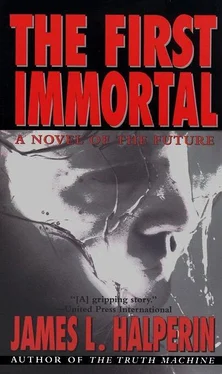He now visualized the first moment that this imposing priest of obvious local lineage had stood at their hotel room door. “Excuse me,” the man had said to them in bass voice and flawless, unaccented diction, “but I believe we’re here for the same reason. Maybe we can help each other.”
Gary had smiled and invited the man inside, although he could tell that Toby looked upon the cleric with nervous skepticism. Toby was no racist, but considering his view of organized religion, Gary understood.
To find Tobias Fiske, Father Steven Jones had flown in that very morning, from Dorchester, Massachusetts. For the priest, whose own ancestry traced back to Jamaica, this “Virgin Mary Restorer”—as Toby and Gary had come to think of him—was no laughing matter.
It seemed Probber had returned from Bethlehem with a concoction of frankincense and myrrh which he would blend with freshly consecrated holy water. These spices, he claimed, had been a portion of the magi’s gifts to the baby Jesus on his birth night. Probber had purportedly managed to procure these most-sacred of relics from a Coptic priest whose family had maintained them with uninterrupted vigilance over these past two millennia.
Probber also claimed that if the emulsion was applied to the violated places of any young girl, she could once again attain that sanctified state of virginity in the eyes of the Almighty. Of course, only Mr. Probber himself could practice the proper technique of such application. And, hey, at only $200 U.S. per restoration (free to the needy), what greater bargain was to be had in all of Christendom?
Surprisingly, Probber’s act had not played to rave reviews on the mainland. Indeed, two of his “treatments” had ultimately come to the attention of grand juries in Miami. But the Jamaican government had proved more enlightened; if there were complaints, Probber would just donate his two-hundred-dollar fee to the police officer in charge and, of course, admonish the constable to do only good works with the money.
In Jamaica, Probber had never so much as been taken in for questioning.
Gary and Toby had mostly regarded such con games with all the gravity they deserved, which is to say, they laughed. But needing a break, both had agreed that setting up Probber would be a good thing, and one hell of a lot of fun. He might be expelled, or perhaps just billy-clubbed to the point of reconsidering his line of work. Either had seemed a satisfactory outcome. And besides, there were worse places to be in November.
Father Steve’s motivations were different. A somewhat cerebrally challenged member of his flock had been taken in by Probber’s used-car tongue, and her thirteen-year-old daughter had been “cured.” Upon learning that Fiske had trailed the man to Kingston, Father Steve had found a way to follow. If there was no satisfaction to be won in debunking the bastard, the enraged priest planned on showing Probber just how painful the wrath of God could be.
Yet when this Roman Catholic reverend presented himself at their hotel, Toby had offered a cool reception, as though a lifetime enemy were suddenly offering to join him in a crucial battle. “Why would you help us?” he’d asked.
“Because the goal is worthy, and because I can,” the cleric had said, paraphrasing an old joke. “In fact, I’ve got a story for you that might help illustrate this good Christian’s attitude about opportune alliances.”
Gary had glanced quizzically at Toby, who gestured the priest to continue.
Father Steve sat on the couch. “Seems my friend Rabbi Abramson was seeking funds for a new synagogue, and thus asked me for a contribution from the Church. ‘Oh, no,’ I had to explain sadly, ‘my bishop would never authorize a donation to build a Jewish temple.’ But then I had an idea. ‘Tell me, Rabbi,’ I asked, ‘what will you do with your old synagogue?’ He answered: ‘Naturally we’ll have to tear it down to make space for the new construction.’ So I prompted, ‘And tearing it down will be part of your cost, won’t it?’ ‘Of course,’ he said. ‘Well then,’ I suggested, ‘maybe you’d care to set up a separate fund for the razing.’ Rabbi Abramson became quite confused, and asked, ‘Why on earth should I go to all that trouble?’ ‘Ah,’ I explained, ‘because that is a fund to which the bishop would gladly contribute.’”
Toby had tried to resist chortling aloud. Apparently, this hadn’t been what he’d expected, but the joke was too fitting, too perfect. At least temporarily, the two had become three.
Gary and Father Steve had spent the next few days posing as different New York newspaper reporters, a publicist for Tobias Fiske’s book tour, and a research assistant. It hadn’t taken long for news of their visit to wend its way through the praetorian levels of the local bureaucracy.
Upon reflection, the Kingston government had decided that Probber’s contribution to the local economy no longer justified such laughingstock publicity as might result from a Tobias Fiske exposé.
Rodney Probber had been taken in for questioning. He had been billy-clubbed. But, of course—as any serious student of early twenty-first century Caribbean history must realize—he’d never been struck.
* * *
Gary knew that after twenty-two years, the clergyman still considered voodoo-cult mysticism the truest form of blasphemy. This may have explained why, despite forty-eight years of splendid service, Father Steve had never risen above the rank of parish priest. Thus, he seemed a plausible confidant to Gary, as well as a true peer: also mid-seventies in years, creative in word, and a worshiper of life.
Gary realized he needed this visit badly and hoped it would go well.
Autocane in hand, he left the elevator and shuffled to the apartment door. Gary’s back ached from years of lopsided movement. The cane helped, but now he wished he could afford bionic trousers.
“Gary Smith!” the jolly cleric beamed. “How are you?”
Gary clasped the large, black hand now extended, and felt comfort from the touch.
“It’s been nearly fifteen years,” Gary said to his old comrade. “Mostly, I can’t believe I’ve come. It seems such an imposition…”
The two men sat in Father Steve’s book- and CD ROM-cluttered study. Gary watched the cleric try to frame his question, and wondered for the first time if he’d chosen a proper counsel. The feeling this room evoked was comfort-sans-perspective, its flavor like the showcasing of an open-reel tape recorder in the 1980s or a record collection in 2005. These vehicles of communication contained beauty, value, and truth, but a less-than-timely efficacy.
Gary mused he might soon hear the priest playing Bach on a slide whistle.
“Things never change so much that I’d consider a visit from you as anything but a welcome event; except that I see you’re troubled, and for that I’m sorry. What’s worrying you?”
“I’ve lost it,” Gary told him simply. “I’m addicted to VR gambling, and steadily losing what little money I have. I never seem to get quite stupid enough to blow it all at once. But I’m not sure the restraint benefits me. Mostly, I prolong my own agony.”
The priest’s eyes opened into a wide-pupiled stare, as only those with artificial corneas could so dramatically affect. “What are you contemplating?”
“The ice.”
“I once heard you call it the hopeful ice many years ago.” The priest leaned forward in his chair.
“You remember that?”
“It’s not so hopeful, is it?”
“Certainly not right now,” Gary sighed. “I don’t know why I’d want a forever of life like this , mindlessly playing games against a machine. And it’s not that it’s a machine per se. It’s that the machine doesn’t care. Jesus, this sounds like a conversation a fifteen-year-old should be having with a guidance counselor.”
Читать дальше












